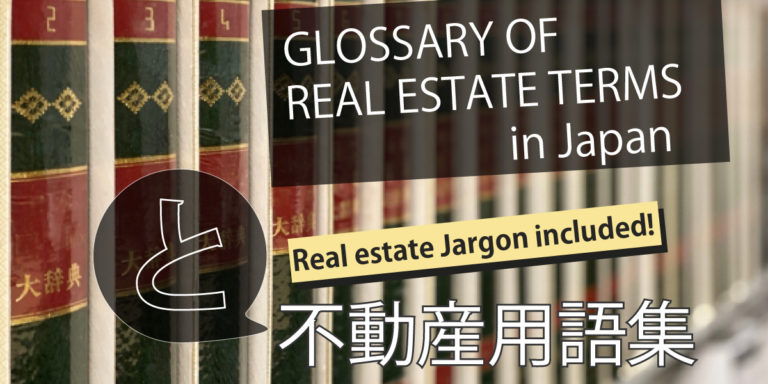- 1 Real estate Terms -と(TO),ど(DO)-
- 1.0.1 登記簿 [TOUKIBO] (とうきぼ)
- 1.0.2 登記事項証明書 [TOUKIJIKOU SHOUMEISHO] (とうきじこうしょうめいしょ)
- 1.0.3 登記済証=権利済証 [TOUKISUMI SHOU = KENRISUMI SHOU] (とうきすみしょう=けんりすみしょう)
- 1.0.4 投資物件 [TOUSHI BUKKEN] (とうしぶっけん)
- 1.0.5 動線 [DOUSEN] (どうせん)
- 1.0.6 塔屋 [TOUYA] (とうや)
- 1.0.7 道路位置指定=位置指定道路 [DOURO ICHI SHITEI=ICHI SHITEI DOURO] (どうろいちしてい=いちしていどうろ)
- 1.0.8 登録免許税=登記料 [TOUROKU MENKYO ZEI=TOUKIRYO] (とうろくめんきょぜい=とうきりょう)
- 1.0.9 通し柱 [TOUSHI BASHIRA] (とうしばしら)
- 1.0.10 特殊建築物 [TOKUSYUKENCHIKUBUTSU] (とくしゅけんちくぶつ)
- 1.0.11 特約 [TOKUYAKU] (とくやく)
- 1.0.12 特優賃 [TOKUYUCHIN] (とくゆうちん)
- 1.0.13 床の間 [TOKONOMA] (とこのま)
- 1.0.14 都市ガス [TOSHI GAS] (としがす)
- 1.0.15 土間 [DOMA] (どま)
- 1.0.16 鳶 [TOBI] (とび)
Real estate Terms -と(TO),ど(DO)-
登記簿 [TOUKIBO] (とうきぼ)
A book containing the record of the registration made for each lot or building.
登記事項証明書 [TOUKIJIKOU SHOUMEISHO] (とうきじこうしょうめいしょ)
A document officially certified by the Registrar as a record of registration made for each lot or building.
*登記簿謄本 [TOUKIBO TOUHON] (とうきぼとうほん) : All the copies of one set of registration papers relating to a property. The registrar’s seal on the last page certifies that the contents are correct.
Nowadays, most 登記所 [TOUKISHO] (とうきしょ) “registration offices” have computer systems and issue a 登記事項証明書 [TOUKIJIKOU SHOUMEISHO] (とうきじこうしょうめいしょ) “Certificate of Registered Matters” as a substitute for a 登記簿謄本 [TOUKIBO TOUHON] (とうきぼとうほん).
登記済証=権利済証 [TOUKISUMI SHOU = KENRISUMI SHOU] (とうきすみしょう=けんりすみしょう)
A document issued by the 法務局 [HOUMU KYOKU] (ほうむきょく) “Legal Affairs Bureau” to a person who has acquired and registered land or a building for the first time through sale or inheritance.
TOUKISUMI SHOU = KENRISUMI SHOU have not been issued since 2005. At present, instead, 登記識別情報 [TOUKI SHIKIBETSU JOUHOU] (とうきしきべつじょうほう) “registration identification information” is issued, which consists of 12-digit alphanumeric characters and plays the role of a password.
The location of the property’s address, property number, purpose of the registration, and the name of the registered owner are listed in the document called 登記識別情報通知 [TOUKI SHIKIBETSU JOUHOU TSUCHI] (とうきしきべつじょうほうつうち) “Notice of Information for Identification of Registration” .
投資物件 [TOUSHI BUKKEN] (とうしぶっけん)
Real estate to be invested in. It is bought and sold among investors.
動線 [DOUSEN] (どうせん)
A pathway for people and goods to travel in a building or in an urban space.
It is an important element to judge the rationality and functionality of a space design. For example, the shorter, non-intersecting and simple lines of movement for household chores and daily tasks are more convenient. On the other hand, in a commercial space, various traffic lines may create a lively atmosphere.
塔屋 [TOUYA] (とうや)
Elevator machine rooms, stairwells, air conditioning and water supply rooms, etc. built on the roof of the building.
道路位置指定=位置指定道路 [DOURO ICHI SHITEI=ICHI SHITEI DOURO] (どうろいちしてい=いちしていどうろ)
The designation of the location of a 私道 [SHIDOU] (しどう) “private road” by a local government.
By being designated as “DOURO ICHI SHITEI”, the private road can become a “Road under the Building Code”.
Therefore, when building on the land bordering on the private road only, it is necessary to obtain “DOURO ICHI SHITEI” for the private road first.
In order to obtain the “LDOURO ICHI SHITEI”, the width of the private road should be at least 4m.
登録免許税=登記料 [TOUROKU MENKYO ZEI=TOUKIRYO] (とうろくめんきょぜい=とうきりょう)
A national tax paid at the registry office when registering ownership of real estate or registering a mortgage.
The registration and license tax is often commonly referred to as a 登記料 [TOUKIRYOU] (とうきりょう)”registration fee”.
通し柱 [TOUSHI BASHIRA] (とうしばしら)
In a wooden building of two stories or more, a single piece of pillar from the base to the pole plate
特殊建築物 [TOKUSYUKENCHIKUBUTSU] (とくしゅけんちくぶつ)
It refers to buildings with special uses, such as buildings that attract a large number of people and buildings that must be specifically regulated for sanitary and fire safety reasons.
The Building Standard Law has especially strict regulations for such buildings.
According to the Building Standards Law, the following uses of buildings are considered as 特殊建築物 [TOKUSYUKENCHIKUBUTSU] (とくしゅけんちくぶつ) “special purpose buildings”.
1. Theatres, cinemas, performance halls, spectatoriums, public halls, assembly halls
2. Hospitals, clinics, hotels, inns, boarding houses, apartment buildings, boarding houses, etc.
3. Schools, gymnasiums, museums, libraries, bowling alleys, skate parks, etc.
4. Department stores, markets, exhibition halls, dance halls, cabarets, restaurants, eating establishments, amusement centers, public bathrooms, etc.
5. Warehouse
6. Car garages, auto repair shops, movie studios
特約 [TOKUYAKU] (とくやく)
Making a contract with special conditions
特優賃 [TOKUYUCHIN] (とくゆうちん)
Abbreviated word of 特定優良賃貸住宅 [TOKUTEI YUROU CHINTAI JYUTAKU] (とくていゆうりょうちんたいじゅうたく) : One of the rental housing provided by a public agency.
This is rental housing for middle-income earners that utilizes the Act on the Promotion of Supply of Excellent Rental Housing. It was created in 1993 as a result of a government program designed to provide middle-income earners with discounted private rental housing in response to skyrocketing rents during the bubble period. In the case of the Tokyo metropolitan government, it is called 都民住宅 [TOMIN JYUTAKU] (とみんじゅうたく).
The quality of the property is higher than other public rental housing such as 公営住宅 [KOUEI JYUTAKU] (こうえいじゅうたく), 公社住宅 [KOUSHA JYUTAKU] (こうしゃじゅうたく), or UR賃貸住宅 [UR CHINTAI JYUTAKU] (ゆーあーる ちんたいじゅうたく).
公営住宅 [KOUEIJYUTAKU] (こうえいじゅうたく) is run by local governments, such as prefectural and municipal governments, and is targeted at low-income residents. For example, Tokyo’s housing is called 都営住宅 [TOEI JYUTAKU] (とえいじゅうたく) and Osaka’s is called 大阪府営住宅 [OSAKA FUEI JYUTAKU] (おおさかふえいじゅうたく).
These are highly public rental houses, so none of them charge key money, brokerage fees, or renewal fees, but not everyone can live in them because they have detailed requirements for living in them.
床の間 [TOKONOMA] (とこのま)
This is the space in the Japanese room that is one step higher than the rest of the room and is used for 掛け軸 [KAKEJIKU] (かけじく) or flowers.
都市ガス [TOSHI GAS] (としがす)
Gas supplied to a wide area by gas pipes piped into the city
土間 [DOMA] (どま)
Concrete and tiled entrance floor surfaces
鳶 [TOBI] (とび)
Workers involved in working at height in construction

